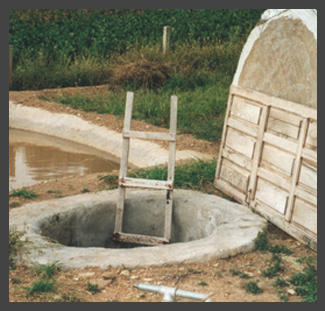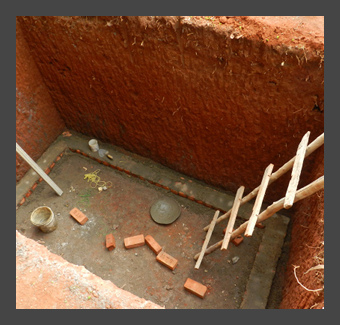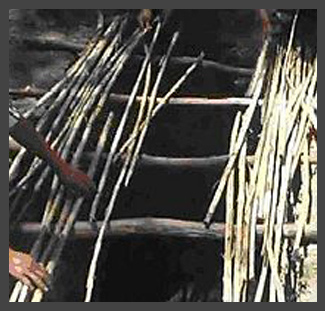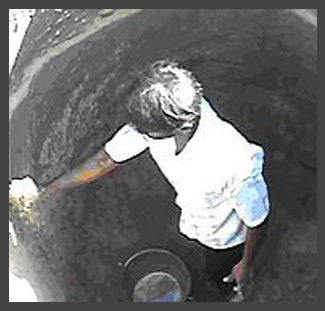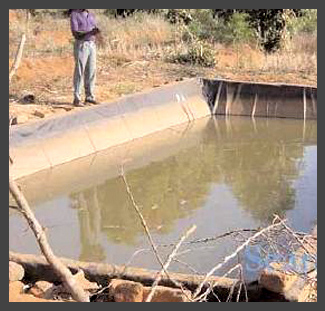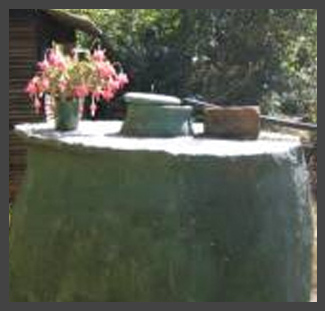Difference between revisions of "Below ground tanks"
From Akvopedia
(→Below ground tank links) |
|||
| (12 intermediate revisions by one other user not shown) | |||
| Line 1: | Line 1: | ||
| + | {{Language-box|english_link= Below ground tanks| french_link=Réservoirs de stockage souterrains | spanish_link= Coming soon | hindi_link= Coming soon | malayalam_link= Coming soon | tamil_link= Coming soon | swahili_link=coming soon | korean_link= Coming soon | chinese_link=Coming soon | indonesian_link= Coming soon | japanese_link= Coming soon }} | ||
| + | |||
One of the best advantages of underground water tanks is the space conserved by simply installing the water tank in the ground. This provides extra or larger space which may be utilized for other purposes. The underground water tank eliminates exposure to weather conditions but must lie above the water-table level. However, below ground tanks are more expensive to build. The plastic-lined tank and the ferrocement jar tank can be either above ground or below ground. | One of the best advantages of underground water tanks is the space conserved by simply installing the water tank in the ground. This provides extra or larger space which may be utilized for other purposes. The underground water tank eliminates exposure to weather conditions but must lie above the water-table level. However, below ground tanks are more expensive to build. The plastic-lined tank and the ferrocement jar tank can be either above ground or below ground. | ||
| − | + | ||
| − | <div style=" background-color: #efefef; text-align: center; -moz-border-radius: 2px; -webkit-border-radius: 2px; border: | + | <div style=" background-color: #efefef; text-align: center; -moz-border-radius: 2px; -webkit-border-radius: 2px; border: 5px solid #dedede; padding: 5px;" > |
| − | {|cellpadding=" | + | {|cellpadding="5" cellspacing="0" width="100%" |
|- | |- | ||
|colspan="5" style="background-color:#efefef;"| | |colspan="5" style="background-color:#efefef;"| | ||
|- | |- | ||
| − | |style="background:#efefef;"|[[Image: | + | |style="background:#efefef;"|[[Image:300px-Underground_tank small.png|center|100px|link=Underground tank]] |
| − | |style="background:#efefef;"|[[Image: | + | |style="background:#efefef;"|[[Image:sump tank.jpg|center|100px|link=Sump tank]] |
| − | + | |style="background:#efefef;"|[[Image:300px-Building_a_horizontal_cistern small.jpg|center|100px|link=Horizontal cistern]] | |
| − | + | |style="background:#efefef;"|[[Image:300px-Building_a_vertical_cistern small.jpg|center|100px|link=EMAS cistern]] | |
| − | + | |style="background:#efefef;"|[[Image:PlasticLinedTank small.jpg|center|100px|link=Plastic-lined tank]] | |
| − | + | |style="background:#efefef;"|[[Image:Ferrocement_water_jar_finished small.jpg|center|100px|link=Small household ferrocement tanks (jars)]] | |
| − | |||
| − | |style="background:#efefef;"|[[Image:300px-Building_a_horizontal_cistern small.jpg|center| | ||
| − | |style="background:#efefef;"|[[Image:300px-Building_a_vertical_cistern small.jpg|center| | ||
| − | |style="background:#efefef;"|[[Image:PlasticLinedTank small.jpg|center| | ||
| − | |style="background:#efefef;"|[[Image:Ferrocement_water_jar_finished small.jpg|center| | ||
|- | |- | ||
|style="background:#efefef;"|<div class="center" style="width:auto; margin-left:auto; margin-right:auto;">[[Underground tank]]</div> | |style="background:#efefef;"|<div class="center" style="width:auto; margin-left:auto; margin-right:auto;">[[Underground tank]]</div> | ||
| + | |style="background:#efefef;"|<div class="center" style="width:auto; margin-left:auto; margin-right:auto;">[[Sump tank]]</div> | ||
|style="background:#efefef;"|<div class="center" style="width:auto; margin-left:auto; margin-right:auto;">[[Horizontal cistern]]</div> | |style="background:#efefef;"|<div class="center" style="width:auto; margin-left:auto; margin-right:auto;">[[Horizontal cistern]]</div> | ||
|style="background:#efefef;"|<div class="center" style="width:auto; margin-left:auto; margin-right:auto;">[[EMAS cistern]]</div> | |style="background:#efefef;"|<div class="center" style="width:auto; margin-left:auto; margin-right:auto;">[[EMAS cistern]]</div> | ||
| Line 28: | Line 26: | ||
</div> | </div> | ||
<br> | <br> | ||
| + | |||
===Field experiences=== | ===Field experiences=== | ||
| − | {| style="width: | + | These projects may be utilizing below ground tanks and are part of the project listing in [http://akvo.org/products/rsr/ Really Simple Reporting (RSR)] on [http://www.akvo.org Akvo.org]. |
| − | |[[Image:rsr 644.jpg|thumb| | + | |
| − | | | + | {|style="border: 2px solid #e0e0e0; width: 60%; text-align: justify; background-color: #e9f5fd;" cellpadding="2" |
| − | + | |- style="vertical-align: top" | |
| + | |[[Image:akvorsr logo_lite.png|center|60px|link=http://akvo.org/products/rsr/]] | ||
| + | |- style="vertical-align: bottom" | ||
| + | |[[Image:project 644.jpg |thumb|center|140px|<font size="2"><center>[http://rsr.akvo.org/project/644/ RSR Project 644]<br>Rwenzori Integrated School WASH Project</center></font>|link=http://rsr.akvo.org/project/644/ ]] | ||
| + | |[[Image:akvorsr.png |thumb|center|140px|<font size="2"><center>[https://akvo.org/improve-and-showcase-your-results RSR Project 0]<br>RSR Project</center></font>|link=https://akvo.org/improve-and-showcase-your-results ]] | ||
| + | |[[Image:project 840.png |thumb|center|140px|<font size="2"><center>[http://rsr.akvo.org/project/840/ RSR Project 840]<br>Rainwater harvesting in Guinee Bissau 2</center></font>|link=http://rsr.akvo.org/project/840/ ]] | ||
|} | |} | ||
| + | |||
| + | <br> | ||
===Below ground tank links=== | ===Below ground tank links=== | ||
| − | * VIDEO: [ | + | * VIDEO: [https://vimeo.com/8453929 Tanks - underground cistern in sandy soil.] EMAS video. |
Latest revision as of 19:17, 28 June 2020
| |
|
|
|
|
|
|
|
|
|
One of the best advantages of underground water tanks is the space conserved by simply installing the water tank in the ground. This provides extra or larger space which may be utilized for other purposes. The underground water tank eliminates exposure to weather conditions but must lie above the water-table level. However, below ground tanks are more expensive to build. The plastic-lined tank and the ferrocement jar tank can be either above ground or below ground.
Field experiences
These projects may be utilizing below ground tanks and are part of the project listing in Really Simple Reporting (RSR) on Akvo.org.
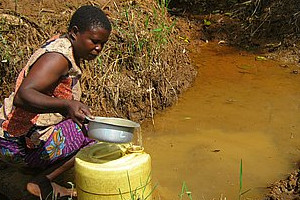 Rwenzori Integrated School WASH Project |
RSR Project |
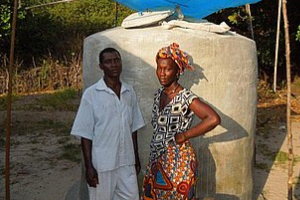 Rainwater harvesting in Guinee Bissau 2 |
Below ground tank links
- VIDEO: Tanks - underground cistern in sandy soil. EMAS video.
